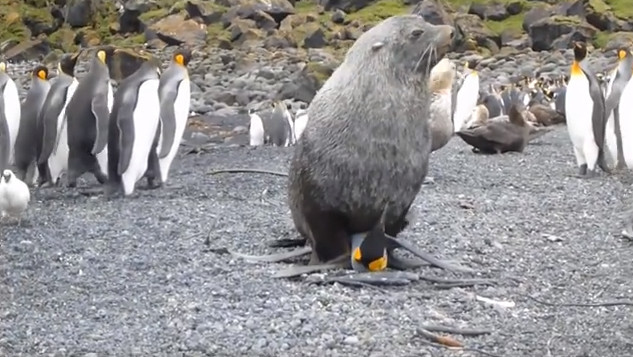Seals with penguins - the most fruitful love of the earth appeared
Antarctica is a land with a lot of peculiar features, and in it there are all the weird "room the" stories of the animal world here.
In the middle of the 20th century, British explorer George Murray Levick had encountered unusual sexual behaviors in species, including and . (the term refers to the act of doing it with dead bodies) .
But perhaps it wasn't all that shocking because the video was published by the BBC, about the scene . the seal was crushing a penguin out to "bully".
In fact, this strange love story is not the first time. It has been recorded since 2006, when a scientist discovered a seal trying to caress a king penguin on Marion Island (an island on the edge of Antarctica).
At that time, experts thought this was an accident, perhaps because the seal was too tired to meet the demand. Some people think otherwise, thinking that it is an act of territorial protection.
Or maybe they're just playing with each other, which just happens to look a bit like an adult's game.
However, since 2014, researchers began to look more closely and found that this behavior took place at least 3 more times.
"Actually, I don't think that scene will happen again since 2006," said Dr Nico de Bruyn, director of the research group, in the journal Polar Biology.

A seal looking for a way to caress a king penguin.
Bruyn said, his group has seen Antarctic seals constantly crushing king penguins, at least three times. It is unclear what the gender of the penguin is, only that they are . victims.
All the walls were done in the same scenario: Seals chased, arrested, and pinned down.
Usually, king penguins are the preferred prey of seals. However, with these rain clouds, the seals usually release their victims. There was only one case where the seal killed my . penguin's love.
The reason why seals have this strange behavior is still a mystery. The reason may be because of the spike in hormones that prevent them from growing in the breeding season. Maybe so.
- Seals mate with penguins
- How to live in the coldest place on Earth
- The secret to pre-existing natural danger of hat seals
- New discovery about the existence of Antarctic penguins
- Seeing the mini version yourself, seals do surprises
- 7,000 Russian seals are in danger of being destroyed
- The pair of gay penguins adopted an egg after a long time to ... boulder incubation
- Penguins get lost in New Zealand
- How do penguins differentiate?
- Seals stray between forests in Sweden
- Mother penguins drop eggs, the whole herd rushes to the rescue
- Seals of film production in the United States
 Animal 'suffering' after hibernation
Animal 'suffering' after hibernation Why do goats climb well?
Why do goats climb well? Scientists were surprised to see chimpanzees eating turtles
Scientists were surprised to see chimpanzees eating turtles Giant catfish died deadly due to drought in Thailand
Giant catfish died deadly due to drought in Thailand